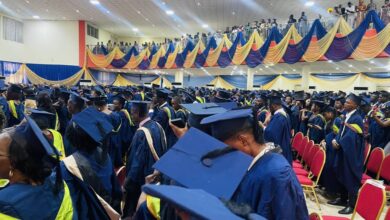Echoes of Dissent: The Controversial Congress and Students’ Solidarity

On the 27th of June 2024, the group, Ẹgbẹ́ Majeobaje, released a statement concerning the Congress Mobilization. A section read, “It is against this backdrop that we reject and even condemn the statement released yesterday by the Student Union Executive Committee, signed by the President and his General Secretary. Also, we consider it an insult that the Student Union Executive Committee will postpone the Congress of Students for the reason stated as ‘unforeseen circumstances’, which was the reason stated in the statement released yesterday.” The aftermath of that action, as well as the moments leading up to it, are essential for many reasons. In this article, we will explore why so, exploring the origins of the dissent, its effect, and the way forward for the future of our Union.
Down Memory Lane, Where it All Started?
The 2021 eight-month strike by the Academic Staff Unions of Universities (ASUU) seemed to have steered the course of the university system in another direction in several areas, most notably the method of generating its funding. We can recall the aftermath of happenings during the strike, which culminated in the Federal Government expressing that it was ‘too broke’ to ultimately shoulder the University Management’s demands in terms of funding. This, in turn, made the management decide to hike the fees, leaving the grass, students, to suffer from the brawl between the two giant elephants, ASUU and FG. At the dawn of the Samson Tobiloba ‘Host ’-led SU administration, rumours of an increment of school fees for the 2022/2023 academic session started circulating among students, resulting in an outcry about its unaffordability by the students. This led to the Students Union agitating, resisting the increment, and updating the students on the development. The Federal Government eventually stopped the tuition fees from increasing across all federal institutions. However, the University of Ibadan management still introduced extra fees, which the Students’ Union tried to reverse but eventually could not.
The start of the current 2023/2024 academic session marked the beginning of the end of the Host-led administration. It coincided with the Federal Government’s decision to let universities decide their fees, which became evident when the freshmen school fees were released, summing up to #278,000 for some, Technology and Utility fees included. Recall that the Host-led administration had a series of meetings with the university management and held an online campaign against the increase using various hashtags. However, these stalled when the baton of leadership was passed to the Aweda Bolaji-led administration, Team Amelioration. As it stands, fees for staylites have tripled across departments, and the existing professional levy for medical students might receive an increase in the foreseeable future. Team Amelioration revealed it met with the school management and that said meeting ended in a deadlock, “ putting them (SU Executives) under pressure to explore other means to put up a fight back’. For this reason, a directive was given from the SU to all students, to halt school fees payment until they were told to do otherwise.
In search of a solution, a motion for Congress was passed by the UI’ SRC on Saturday, the 23rd of June 2024, to address the uncertainty regarding payment of fees. The energy in various quarters suggested that all looked set for the proposed Congress on the 29th. However, there was a shock as on the 27th, a press release signed by the President and General Secretary stated that the Congress had been postponed indefinitely ‘due to unforeseen circumstances’. From here on out, the issue devolved dramatically.
Genesis of the In-House Dissent
Over the past week, we witnessed the back and forth by the Executive Council concerning the Congress, which was earlier directed by the SRC to hold, essentially going against the SRC’s resolution. From the play of these events, one can sense the council’s unprecedented ‘display of proactiveness’ in these crucial times without presenting valid reasons to move the congress till further notice. This action triggered a factional part of the SRC, Ẹgbẹ́ Majeobaje, a group of which Hon. Babatimehin Peace – who had moved the motion for Congress in the first place – is a member. In their June 29 Press Release, Ẹgbẹ́ Majeobaje asked the populace to disregard the SU’s directive and reassured that the Congress still stands, pointing to the 2019 Students’ Union reviewed constitution, Articles VII and XIII, both of which clearly show that the absence of the President – a reason cited – does not warrant the indefinite postponement of the congress, as the article already made a provision for it and grants the Executive Council no such powers. Ẹgbẹ́ Majeobaje went on to hold the Congress, but unfortunately, a quorum was not formed, so resolutions could not be made. However, there has been palpable silence from a larger part of the SRC, including the Speaker, and observed support towards the stance of the Students’ Executive Committee can be noticed among other student leaders, including the Council of Hall Chairpersons.
Article XIII: Interpreting the Constitution
Logical interpretation of the above, combined with due process, clearly shows that the Students’ Union Executive Committee defaulted by failing to hold the Congress has summoned and as agreed per the first meeting. This singular action raises many concerns about how much influence external forces are wielding on the Executive Council. Postponing Congress for a matter as pressing as school fees is an issue, but doing so and failing to give substantial reasons is even worse. It’s taunting the very students who elected them in the first place. At the very least, students deserve to know the reasons in precise detail.
However, going by the above, the ‘Congress’, which eventually did hold, was also flawed. Sections (a) and (f) of the article demand that “the President shall be the Chairman of the Congress. In his absence, the Vice President or in that order the Speaker or any member elected by a validly constituted Congress” and “The quorum for a valid meeting of Congress shall be 500”. There was neither a quorum nor a Chairman at the Congress, as no one was elected. This means that the recommendations circulated by the group, including absentee SRC members explaining their absence, the SU organising a symposium for a collective stance on school fee increment, solidarity with ‘victimised students’ scheduled to face an SDC Panel on July 2nd 2024 etc. are for the most part, non-binding, and open to dismissal by the student populace. Perhaps a better course of action would have been to summon the Executive Council before the House, demanding a proper explanation for the Congress’ postponement and eventually meting out discipline, if necessary.
Which Way to Go?
Several theories abound about the actual reason for the postponement of Congress. However, conversations with past and present members of the SRC indicate that it can be traced to the management. In that case, one must wonder how much of an instrument of students the Congress truly is. These limitations from above make it easy to see why students side with the members of the SRC who decided to move on with the Congress. It’s a matter of being one with the Union. And the Executive Council of this Union can not afford to be more accountable to these forces than they are to the students they represent.
Some might argue that students have not co-operated well enough with the Union’s leaders, especially concerning the directive to hold off on payments. But this would be ignoring a lot of context. The meeting of the Host-led Administration with the management on the 6th of May ended in a deadlock, a meeting that had been highly anticipated as a possible source of relief. To date, nothing else from the Union appears to be remotely convincing. Aside from that, there hasn’t been sufficient information on behind-the-scenes proceedings. Wait till when? With a deadline in view? What other options do students have other than paying the sacrificial price – for those who could still afford to – when the management sent each student a mail stating that it would not extend any registration process for this session? The blame has to be directed elsewhere.
This leads us back to Congress, which has to hold and must be immediate. We are already multiple weeks into the semester. Classes have begun, and for some, tests have been written. We can not afford to waste any more time. And we can not have a Congress with apparent discord among the student ranks. We need a united voice. Leaders from both arms of the Union have to set aside their differences, with disciplinary measures if necessary, to ensure that we face the battle in front of us as one voice. Massive mobilisation for Congress will only be possible when these are sorted. If not, the only quorum we will form will be at the various payment points.
“I say to you all, once again — in the light of Lord Voldemort’s return, we are only as strong as we are united, as weak as we are divided.” – Dumbledore





One Comment